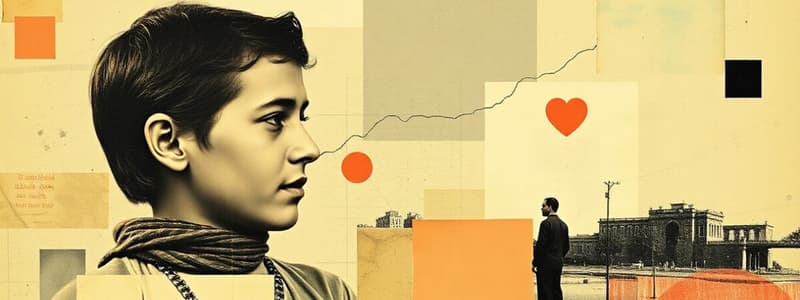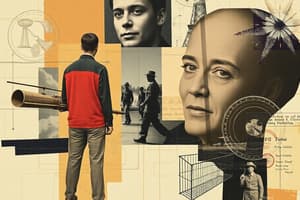Podcast
Questions and Answers
What does cultural anthropology primarily study?
What does cultural anthropology primarily study?
Which term refers to the study of human beings in anthropology?
Which term refers to the study of human beings in anthropology?
What is the main focus of political science?
What is the main focus of political science?
What is cultural relativism in anthropology?
What is cultural relativism in anthropology?
Signup and view all the answers
Which field of anthropology studies genetics and human evolution?
Which field of anthropology studies genetics and human evolution?
Signup and view all the answers
What does the concept of holism in anthropology emphasize?
What does the concept of holism in anthropology emphasize?
Signup and view all the answers
Which aspect of society is specifically examined by sociology?
Which aspect of society is specifically examined by sociology?
Signup and view all the answers
Ethnocentrism is the opposite of which concept in anthropology?
Ethnocentrism is the opposite of which concept in anthropology?
Signup and view all the answers
What perspective did George Simmel contribute to sociology?
What perspective did George Simmel contribute to sociology?
Signup and view all the answers
Which characteristic of society asserts that it is distinct from observable physical entities?
Which characteristic of society asserts that it is distinct from observable physical entities?
Signup and view all the answers
How do cooperation and conflict function in society according to the characteristics discussed?
How do cooperation and conflict function in society according to the characteristics discussed?
Signup and view all the answers
What does the characteristic 'Society is a Process not a Product' imply?
What does the characteristic 'Society is a Process not a Product' imply?
Signup and view all the answers
Which of the following statements about the relationship between culture and society is accurate?
Which of the following statements about the relationship between culture and society is accurate?
Signup and view all the answers
Which factor is NOT commonly associated with social change?
Which factor is NOT commonly associated with social change?
Signup and view all the answers
What is the primary focus of political change?
What is the primary focus of political change?
Signup and view all the answers
Which characteristic of politics emphasizes the use of legal authority to enforce compliance?
Which characteristic of politics emphasizes the use of legal authority to enforce compliance?
Signup and view all the answers
What does the term 'Palakasan system' refer to in political practices?
What does the term 'Palakasan system' refer to in political practices?
Signup and view all the answers
Which political symbol is associated with capitalism and liberalism?
Which political symbol is associated with capitalism and liberalism?
Signup and view all the answers
How does the Catholic Church influence politics in the Philippines?
How does the Catholic Church influence politics in the Philippines?
Signup and view all the answers
What role does socialization play in an individual's development?
What role does socialization play in an individual's development?
Signup and view all the answers
What is a characteristic of a 'Traditional Politician (TRAPO)'?
What is a characteristic of a 'Traditional Politician (TRAPO)'?
Signup and view all the answers
Which of the following is a representation of economic symbolism?
Which of the following is a representation of economic symbolism?
Signup and view all the answers
How does social interaction contribute to individual identity according to socialization?
How does social interaction contribute to individual identity according to socialization?
Signup and view all the answers
Which color is associated with liberalism in political symbolism?
Which color is associated with liberalism in political symbolism?
Signup and view all the answers
What is a defining characteristic of a coup d'état?
What is a defining characteristic of a coup d'état?
Signup and view all the answers
Which term describes the process by which individuals learn and adopt aspects of a culture different from their own without losing their original cultural identity?
Which term describes the process by which individuals learn and adopt aspects of a culture different from their own without losing their original cultural identity?
Signup and view all the answers
What best distinguishes rebellion from a coup d'état?
What best distinguishes rebellion from a coup d'état?
Signup and view all the answers
Cultural relativism advocates for which of the following perspectives?
Cultural relativism advocates for which of the following perspectives?
Signup and view all the answers
Which of the following factors does NOT contribute to cultural change?
Which of the following factors does NOT contribute to cultural change?
Signup and view all the answers
What is the primary outcome of ethnocentrism?
What is the primary outcome of ethnocentrism?
Signup and view all the answers
Which concept refers to the sharing of cultural elements between groups resulting from migration and media?
Which concept refers to the sharing of cultural elements between groups resulting from migration and media?
Signup and view all the answers
When is a person most likely to exhibit ethnocentric behavior?
When is a person most likely to exhibit ethnocentric behavior?
Signup and view all the answers
What term describes the expectations of behavior attached to a particular status in society?
What term describes the expectations of behavior attached to a particular status in society?
Signup and view all the answers
Which of the following is NOT a characteristic of primary groups?
Which of the following is NOT a characteristic of primary groups?
Signup and view all the answers
What type of social group is defined by a person identifying with and feeling loyalty towards it?
What type of social group is defined by a person identifying with and feeling loyalty towards it?
Signup and view all the answers
A group that influences an individual's attitudes and values through direct interaction is known as what?
A group that influences an individual's attitudes and values through direct interaction is known as what?
Signup and view all the answers
Which term refers to the conflict that arises among roles connected to two or more statuses?
Which term refers to the conflict that arises among roles connected to two or more statuses?
Signup and view all the answers
Which of the following best describes secondary groups?
Which of the following best describes secondary groups?
Signup and view all the answers
Which group is considered a negative reference group?
Which group is considered a negative reference group?
Signup and view all the answers
Which type of network exists within organizational hierarchies?
Which type of network exists within organizational hierarchies?
Signup and view all the answers
Study Notes
Natural and Social Sciences
- Natural science examines the physical world, while social science investigates human behavior and societies.
Anthropology
- From Latin “anthropologia” and Greek “anthropos” (human) + “logos” (study).
- Franz Boaz is recognized as the father of modern anthropology, focusing on human beings.
Fields of Anthropology
- Cultural Anthropology studies contemporary societal practices including religion, language, and traditions.
- Biological/Physical Anthropology explores human origins, genetics, race, and evolutionary processes.
- Linguistic Anthropology examines language evolution and its societal connections.
- Archaeology analyzes material remains from past human life concerning customs and beliefs.
Sociology
- Originates from the French “socius” (companion) and Greek “logos” (study).
- Focuses on understanding society and social interactions.
Political Science
- The systematic study of government, politics, and political power.
- Politics originated with ancient Greek concepts.
Interconnections
- Anthropology and Sociology: Explore cultural practices.
- Anthropology and Political Science: Investigate power relations.
- Sociology and Political Science: Analyze social forces.
- Combined focus on society across all three disciplines.
Perspectives in Anthropology
- Holism: Emphasizes comprehensive understanding of human value.
- Cultural Relativism: Advocates understanding cultures on their terms without judgement.
- Comparison: Involves examining similarities and differences between cultural practices.
Political Science
- Analyses collective decision-making and actions by groups.
- Encompasses governance structures, political behavior, and the distribution of power.
Culture
- Defined as the patterned way of life reflecting both individual and social dynamics.
- Derived from Latin "clique/cultus," indicating refinement and growth.
Characteristics of Society
- Abstract Nature: Society as a complex of relationships, not just a visible structure.
- Diversity: Society’s growth driven by likeness and differences among individuals.
- Cooperation and Conflict: Both integral to social interaction and development.
- Process: Society evolves over time rather than being static.
- Stratification: Class divisions shape social dynamics and power distribution.
Cultural Change
- Driven by contact, technology, and environmental factors.
- Cultural Diffusion: Spread of cultural elements through interactions.
- Acculturation: Adaptation to different cultures while retaining one’s original customs.
- Assimilation: Complete adaptation to a majority culture, often losing original identity.
Cultural Relativism vs. Ethnocentrism
- Cultural Variation: Different values and norms exist across cultures.
- Cultural Universals: Shared traits among all cultures (e.g., education, courtship).
- Cultural relativism promotes understanding without imposing one’s own cultural biases, while ethnocentrism views one’s culture as superior.
Political Symbols and Practices
- The Republic of the Philippines reflects national values through its logo.
- Political symbols are used to express ideologies and policies.
- Color symbolism: Black (anarchism, Catholicism), Blue (conservatism), Gold (capitalism).
- Palakasan system: Connections and influences among powerful figures.
Economic Symbols and Practices
- Economic symbols represent financial stability and systems (e.g., currency, stock markets).
- Culture and economic practices are interlinked through shared values and behaviors.
Socialization
- The process through which individuals develop identities and social skills necessary for society.
- Involves learning norms and roles through interactions with others.
Social Institutions
- Key institutions include family, education, religion, government, and economy.
- Serve as the foundation for societal organization and group interactions.
Social Groups
- Primary Groups: Small, personal, and emotionally connected, like families.
- Secondary Groups: Larger and more impersonal, focused on specific goals (e.g., corporations).
In-Group vs. Out-Group
- In-Groups: Groups individuals identify with, fostering loyalty and connection.
- Out-Groups: Groups individuals do not identify with, often associated with opposition.
Reference Groups
- Used for social comparison and shaping individual attitudes and behaviors.
- Can be positive (mentors) or negative (groups to avoid).
Types of Social Networks
- Formal Networks: Defined by organizational structures and hierarchies.
- Informal Networks: Based on friendships and casual interactions, enhancing social cohesion.
Studying That Suits You
Use AI to generate personalized quizzes and flashcards to suit your learning preferences.
Description
This quiz covers key concepts in anthropology and sociology, including their definitions and the various fields of study within each discipline. Explore the contributions of notable figures like Franz Boaz and understand the distinctions between cultural, biological, linguistic anthropology, and sociology's focus on social interactions. Test your knowledge on the dynamics of human societies and their evolution.




